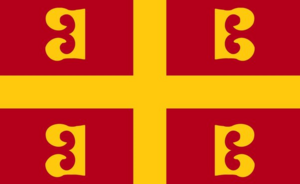The Roman Imperium
Overview
The Roman Imperium count's itself among China and Japan as one of the oldest civilizations of the world. It is a conservative constitutional monarchy and though the Emperor holds no temporal power, as defender of the Orthodox faith his influence is great. The Roman Imperium is but a fragment of its ancient height and though the city that birthed it remains within its borders, (something known as the 'The Last Gift of Belisarius') the capital lies within the great city of Constantinople, known to it's residents simply as 'the city'.
The Romans are one of the major powers of the Sol system, the leading nation of bloc known as the Union of Europa. The first nation to reach space, they have a storied history of spaceflight and maintain a number of inner and outer system colonies. Though once allies of several major European powers the Roman Imperium has grown distant from Western Europe and the European Union due to the conservative influence of Orthodox Christianity which stand in constrast to the more liberal west, as well as the historic enmity with Germany, the leading nation of the bloc.
It is a major producer of industrial and agricultural goods as well as being a pioneer of cybernetics due to highly restricted laws around genetic engineering. It's largest colony is Alexopoulos in the Arcadia Planitia region on Mars, though the most important colonial facility is Pallas, a major hub for Roman mining activities in the asteroid belt.
History
The Roman Imperium has a long and byzantine history, stretching back two millennia. It rose from the city of Rome in Italy, a militant city state which would rise to dominate the pennisula before becoming the Roman Republic, which would reach even further, to dominate Europe and North Africa. A period of increasing political unrest and disorder ultimately lead to the formation of the Roman Empire in 27AD. A century of peace known as the Pax Romana remains the height of the Empire before the Western regions ultimately fell in the 5th century.
The rise of Christianity coincided with the fall of the western empire in the 4th and 5th century AD and the Empire stabilised enough that by the middle of the 6th century, it reconquered Italy. Further challenges arose with the rise of Islam in the 7th century and continued wars with the Sassanid empire to it's East. However in 634AD a Roman Army under Theodore a brother of Emperor Heraclius crushed the Army of the Rashidun Caliphate at the battle of Ajnadayn, which ultimately lead to the decline and collapse of the Rashidun Caliphate.
700s to 1800s TBD.
Throughout the 1800s and early 1900s, the power of the Emperor was gradually curtailed by the Senate and in 1933, with the establishment of the People's Assembly and universal suffrage.
The Romans fought on the side of the Allies in World War 1 against the Holy Roman Empire in 1920, sparked by the assassination of an Elector Prince and again in 1939-1947 against Germania.
